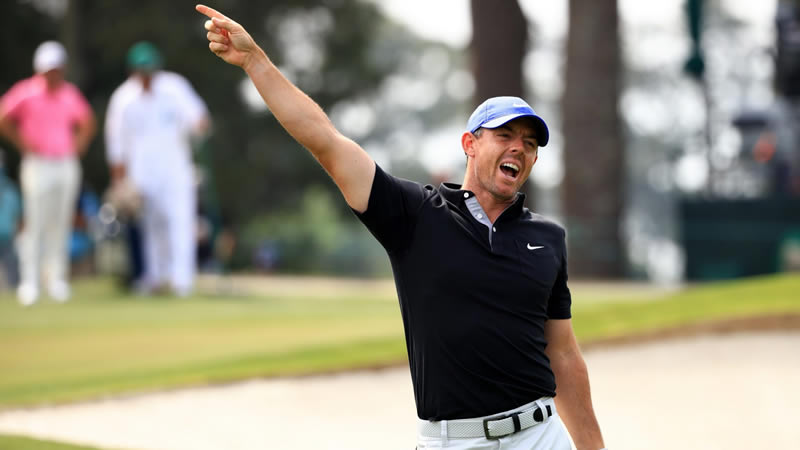
Rory McIlroy hits his own father and finds water twice as Masters misery goes on
Share0Even if a green jacket still eludes him, Rory McIlroy can rest easy in the knowledge that he has explored every quirk of Augusta topography, from the waste ground beside the Butler cabins to the back of his father’s leg.
Yes, 10 years after throwing away a four-shot lead with his tragicomic walk in the woods, the perennial Masters page boy truly outdid himself this time. Swinging the club about as accurately as Kate Winslet in Titanic swung an axe to rescue her doomed lover, he contrived to send his second shot at the seventh straight into the calf of unsuspecting dad Gerry. “I should ask for an autographed glove,” muttered McIlroy Snr, who had barely broken stride. They make them tough in Holywood.
In his own family, McIlroy will struggle to live this one down. He and his father are uncommonly close, both imbued with the golfing gift and both deciding to relocate to Florida, where Gerry is a popular member at Seminole, alongside gridiron great Tom Brady. But there is little that Gerry enjoys more in the relationship than to trash-talk his son. On one occasion, while they were debating how many shots Rory should give him at the Dunhill Links pro-am, Gerry piped up: “To lose two days in a row would really knock your confidence.”
After becoming an unwitting shooting target in front of a global TV audience, he now has ammunition to last a lifetime. The very nature of the incident will put a fresh spin on the idea of pulling one’s leg.
Though it’s unconfirmed due to the mask, I’m pretty sure Rory hit his father with his approach on 7 😂 Hope the legend Gerry is doing alright #TheMasters pic.twitter.com/4l2JSsTwpq
— Rory McIlroy Tracker (@RMTracker) April 8, 2021
While McIlroy routinely falls short of the prize he covets most, he never fails to bring the cabaret. When Tiger Woods was in his Augusta pomp, he generated what became known as the “Tiger roar”. Throughout this opening round, the sound most commonly heard was the “Rory fore”. “Fore right!” he shouted after two of his first three-shots, and again at the seventh, albeit too late for a blissfully unaware Gerry to hear. In the threeball ahead, Dustin Johnson and Lee Westwood did not need to look for where McIlroy was, so frequently did they hear his ball clatter into the loblolly pines.
McIlroy is stricken by a nightmare to golfers second only to the chipping yips: namely, the two-way miss. When he was not flaring shots far out to the right, he was dragging them left, carelessly short-siding himself at the par-three sixth en route to the scratchiest 76. Yet again, he sabotaged his tournament almost before it had begun. Recent history suggests that these rogue rounds are immutable parts of the McIlroy repertoire, that he will now string together three straight 68s for a back-door, top-10 finish. It has been the story of his Masters career since 2015, that he seems only to discover his finest form when he is unburdened of expectations, and when it is all far too late.
On this occasion, the problems do not seem solely psychological. In his technique, McIlroy also looks confused. One moment he is talking about trying to emulate Bryson DeChambeau. The next, having trashed the biomechanics of his glorious swing, he says he is trying to be more like Zach Johnson. Two more diametric opposites you could hardly wish to find: one is a jacked-up physicist treating every major as an audition for World’s Strongest Man, while the other is a short-hitting fairways-and-greens merchant who takes pride in what he calls “boring golf”. The fact that McIlroy regards them both as role models sums up the state of his addled mind.
Briefly, it appeared as if McIlroy could, to use another Woods idiom, “Band-Aid it around”. Fearing another first-day implosion, and with the course playing treacherously, he knew he would protect his score simply by staying on the short grass. Alas, the wounds in his game are not merely superficial. They are deep enough for him to have sought the counsel of Pete Cowen, a coach who specialises in salvage operations. He insists that it is a short-term fix, that he has no intention of leaving childhood mentor Michael Bannon in the long run. But on this evidence, he needs all the help Cowen can give him.
The theory is that McIlroy is spooked by the pressures of Augusta, where he needs to win to become only the sixth player to complete the career Grand Slam. His challenge is more fundamental than that, though, as he fights his way out of this funk. “A journey,” he calls it. After this scattergun round, one that included a memorable rebound off a paternal hazard, it looks more like a road to nowhere.
